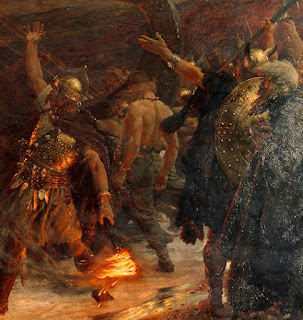Babel, or the Necessity of Violence, which won the 2022 Nebula award, is a pretty good historical fantasy: the writing is good, the characters are fine, and the magic system is a stroke of genius. In Kuang's world, magical power comes from the impossibility of exact translation: spell casters, known as translators, create magic by pairing words in different languages that mean slightly different things, chosen so that the difference between them resonates with the power sought.
But that isn't what seems to interest most people about Babel; wikipedia's summary of the plot begins, "the book criticizes British imperialism, capitalism, and the complicity of academia in perpetuating and enabling them." One reviewer wrote that Babel "educates and urges us to reframe—to (re)translate—the dominant narrative of what the West calls its civilization."
The story is set in Britain and Canton circa 1840, and the plot has much to do with the outbreak of the Opium Wars. The main characters have come to Oxford to become translators, studying in the tower known as Babel to master this arcane art and thus become important, powerful people within the British empire. One is half Chinese, another Haitian, a third from a wealthy Muslim family in India; they have a fourth classmate who is English, who struggles to understand why they hate the Imperial system that seems pretty good to her. Radicalized by the experienced of helping to launch a sleazy imperial war, the three non-Brits join a secret society plotting rebellion against the empire, and in the end things come to an explosive conclusion.
Ok, fine, there was a lot to hate about British imperialism. To me that means especially the contempt that the British (and French) showed toward the rest of the world's peoples; the radicalism of Babel is most powerful when it dwells on the face-to-face racism and snobbery that the non-British characters have to endure. But it seems to me that if your idea of the relationship between Europe and the rest of the world gets too caught up in personal slights, you are missing some really big and important things. What follows may strike you as pedantic, but Kuang filled her book with footnotes justifying the historical accuracy of her claims. For example, when the British classmate says that the British eliminated slavery in India, one of the other characters responds that this is only partly correct; the 1833 law banned chattel slavery but explicitly exempted a lot of statuses in India that were very close to slavery. This is true, and kudos to Kuang for knowing the history at this level.
The thing is, the British did not invent any of the ways that people in India oppressed each other. Some, such as debt slavery, go back to our earliest records of Indian life, while others emerged after the conquest of most of India by Muslim invaders. Rather than loading all the evils of life in India onto the poor Brits, Kuang might have glanced at the writings of a certain Narendra Modi, who regularly asserts that India suffered under foreign rule for centuries before the British arrived. Modi assigns at least as much blame for India's woes to Muslim conquerors as to Europeans. Me, I think even that is short-sighted, and I suspect earlier native tyrants were just as bad.
But as I said the main events of the plot have much to do with China, so lets look there. In 1840 the British attacked China in what we call the First Opium War, the spark for which was the refusal of the Qing government to allow "free trade" in the opium that the British were shipping from India to China. The British easily smashed the Qing fleet, destroyed Chinese coastal defences, and in 1842 forced the emperor to sign the Treaty of Nanjing, which legalized the opium trade, handed Hong Kong island to the British, expanded the foreign enclaves in other Chinese cities, and generally re-arranged the China trade in ways more favorable to the Europeans.
Which was dastardly. But let me ask a question about China: who, exactly, was in charge there? Not the Chinese. China had been ruled since 1644 by Manchu invaders who called their rule the Qing dynasty. Among other things they imposed restrictions on the dress and hair of their Chinese subjects that many Chinese found every bit as galling as European racism. The Opium Wars did, in fact, trigger armed uprisings by Chinese people, but not against the British; instead they rebelled against the Manchus under the slogan Fǎn Qīng fù Míng, that is, "Oppose Qing and restore Ming." (Ming was the last dynasty led by Han Chinese emperors. Incidentally the end of Qing rule in 1911 led to genocidal massacres of Manchus so effective that there are now very few Manchus in China.)
So when Chinese ambassadors told British traders that there was nothing they wished to import, since China already had everything it needed – a statement Kuang takes at face value – what they really meant was that the Manchu elite had everything they needed, and that they saw foreign trade as a destabilizing influence that threatened their rule. Future events showed that plenty of Chinese people did want European goods like steam engines and cheap cotton cloth.
Kuang, in her books, never, ever, even once acknowledges that non-Europeans oppressed each other; all of oppressive evil mentioned is perpetuated by the British. This is, you know, wrong. But that's not why I write about it; I write about it because I think it is a highly pernicious and destructive doctrine that is all too pervasive in our world. We have had to witness the sad spectacle of anti-imperial westerners praising vicious thugs who wrap themselves in the banner of anti-American, anti-Western sentiment: Vladimir Putin, the Assads, the mullahs in Iran, the Shining Path, the Khmer Rouge. Anti-imperialism is an ideology that destroys thought as powerfully as any other ideology does; once you put on those glasses, you are forced, it seems, to go around excusing Russian, Syrian, Chinese or whatever other tyranny and murder because at least its perpetrators are standing up against western imperialism.
But that is, to my mind, the disputable part. Western imperialism was often terrible, and it exacted a grim political and psychic price in many parts of the world. But for Kuang, as for many others, that is not enough. Her rebels are not satisfied with accusing Britain of political crimes and evil racism, but somehow want to blame it for disease and famine as well. This is a worldwide habit. We have Indian historians who insist that the British caused horrible famines, Native Americans who attribute epidemics to some kind of primitive germ warfare involving infected blankets, and on and on.
So another question: when we are "educating" each other about "dominant narrative of what the West calls its civilization," are we talking about civilization as in good manners, or are we talking about who lives and for how long? Because if you care about preserving and extending human life, if you think that people dying of famine and disease is bad, then the rise of modern Europe was the greatest event in the history of humanity, and this is not disputable at all.
Demography is a grim, amoral science. It is a numbers game that does not care about good intentions. Confusion about this is another horrible mental habit that I wish to fight. People being mean and nasty to each other, or oppressing each other, has very little to do with how long people live or how they die. Death by famine and epidemic disease was the reality of human life for 7,000 years, and there was very little governments could do about it no matter how kind-hearted, virtuous, or impecabbly native they might have been.
It was Europe, with some later help from the US, that gave us the science and technology that multiplied human life beyond anything ever seen before. Maybe some colonial wars were accompanied by destructive famines, but it was western inventions – the railroad, the steamship, the tractor, artificial fertilizer, hybrid seeds, chemical pesticides – that made famine practically obsolete. When two German chemists named Bosch and Haber figured out how to make ammonia from atmospheric nitrogen, they added more years of human life to the planet than have been lost in all of humanity's wars put together. Even if you want to blame Europeans for all the 100 million or so Native American deaths caused by disease, well, India recently added a billion people in thirty years.
The explosion of the earth's population was almost all caused, not by rising birth rates, but by falling death rates. The seven billion people we have added to the earth in the past 150 years are all alive because of the revolutions in science and technology that began in Europe. Penicillin, a British discovery, has by itself saved more lives than were lost to the whole 300-year regime of Atlantic slavery.
I believe, as I have argued here before, that what made Europe so wildly creative was gathering all the knowledge of the world together in a few cities; and of course part of that accummulation of learning was funded by the profits of colonial trade and the exploitation of slaves.
Which means that if what you care about is people not dying, then you ought to cheer Europe's global expansion as the greatest event in history.
If you want to object to European racism, slave trading, imperial double-dealing, or their nauseating self-backpatting about sometimes fairly minor reforms, sure, fine, whatever. I don't think they were any worse than previous generations of conquerors, but that might be a matter of taste.
But spare me all talk of Europeans killing people or causing famines. Because if human life is a surpeme value, then modernity, mostly created by Europeans, has succeeded like nothing else ever. If you care about extending human lives and ending hunger you should forget about reframing the narrative and try to get people more science. While you're at it, maybe you could try to get them more democracy and more human rights.
Sometimes it is not violence that is necessary; it is wisdom.


















































